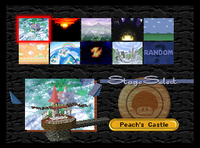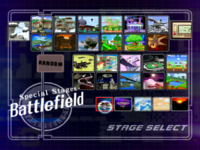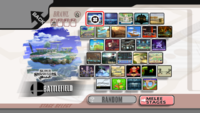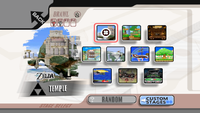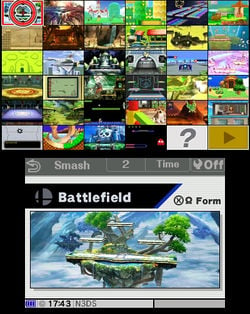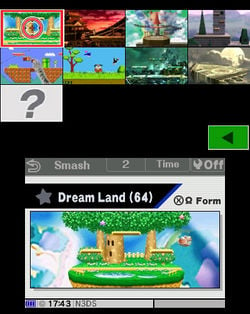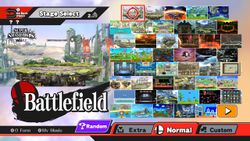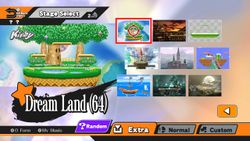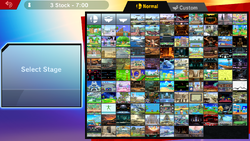Stage: Difference between revisions
Unnamed anon (talk | contribs) Tag: Mobile edit |
(→Trivia) |
||
| (19 intermediate revisions by 17 users not shown) | |||
| Line 1: | Line 1: | ||
{{ArticleIcons|series=y}} | {{ArticleIcons|series=y}} | ||
{{For|other uses of the term|Stage (disambiguation)}} | {{For|other uses of the term|Stage (disambiguation)}} | ||
[[File: | [[File:Final Destination Brawl.JPG|300px|thumb|The Final Destination stage in ''[[Super Smash Bros. Brawl]]'' is an example of a typical stage in the ''Super Smash Bros.'' series.]] | ||
A '''stage''' ({{ja|ステージ|Sutēji}}, ''Stage''), also called a '''level''', '''map''', '''arena''', '''stadium''', or '''board''', is a location in which [[Fighter|characters]] fight or complete objectives. The word "stage" refers to the entire loaded location, but can also refer to the ground or large central [[platform]] within the level. Though versus mode stages are the most commonly recognized and utilized, single-player mode stages such as [[Race to the Finish]] or [[Trophy Collector]] exist as well for purposes other than fighting others. | A '''stage''' ({{ja|ステージ|Sutēji}}, ''Stage''), also called a '''level''', '''map''', '''arena''', '''stadium''', or '''board''', is a location in which [[Fighter|characters]] fight or complete objectives. The word "stage" refers to the entire loaded location, but can also refer to the ground or large central [[platform]] within the level. Though versus mode stages are the most commonly recognized and utilized, single-player mode stages such as [[Race to the Finish]] or [[Trophy Collector]] exist as well for purposes other than fighting others. | ||
==Versus mode stages== | ==Versus mode stages== | ||
Most '''[[versus mode]] stages''' in each of the ''{{b|Super Smash Bros.|series}}'' series games are available from the [[starter stage|start]], though a small number must first be [[unlockable stage|unlocked]] by completing certain objectives. Since ''[[Super Smash Bros. 4]]'' some stages are made available through updates and are [[downloadable]]. Most stages, like [[Princess Peach's Castle]], are derived from places in playable characters' [[universe]]s. ''[[Super Smash Bros. Melee]]'' introduced two stages unique to the | Most '''[[versus mode]] stages''' in each of the ''{{b|Super Smash Bros.|series}}'' series games are available from the [[starter stage|start]], though a small number must first be [[unlockable stage|unlocked]] by completing certain objectives. Since ''[[Super Smash Bros. 4]]'' some stages are (or were in ''SSB4''{{'}}s case) made available through updates and are (were) [[downloadable]]. Most stages, like [[Princess Peach's Castle]], are derived from places in playable characters' [[universe]]s. ''[[Super Smash Bros. Melee]]'' introduced two stages unique to the {{uv|Super Smash Bros.}} universe — [[Battlefield]] and [[Final Destination]]. In ''[[Super Smash Bros. Brawl]]'', stages derived from universes without associated playable characters were introduced, namely [[Smashville]], [[Hanenbow]], and [[PictoChat]]. Additionally, not every playable character has a stage from their own universe; the {{uv|Fire Emblem}} universe lacked one in ''Melee'' (though [[AKANEIA|one]] was planned), and the {{uv|R.O.B.}} universe has, for unknown reasons, never had a stage. Since ''Melee'', each ''Smash'' game has included several [[Past Stages]] that debuted in previous games. These stages have either no or minor alterations (an example being [[Dream Land]] in ''Smash 4'', where the top blast line is much closer to the stage than it was in ''64'' or ''Melee''). ''[[Super Smash Bros. Ultimate]]'' changes this, giving older stages a more refined and detailed design. | ||
Stages range in size from the large [[The Great Cave Offensive]] and [[Rumble Falls]] to the small [[Yoshi's Story]] and [[Peach's Castle]]. Typically, stages involve a large central [[platform]] with [[ledge]]s, multiple smaller platforms, and [[blast line]]s above, below, and to the left and right of the visible area. Some stages, such as {{SSBM|Mushroom Kingdom}} and [[Coliseum]], have floors that continue past the edge of the visible area and pass through a side blast line. These edges are known as "walk-off edges" or "walk-offs" because characters can walk offscreen without the need to become airborne. Stages with walk-off edges on both the left and right, like [[Bridge of Eldin]], are referred to as "walk-off stages", and only a select few, like {{SSBM|Yoshi's Island}}, have only one walk-off. Some walk-off stages, such as [[Onett]], have lower blast lines that are inaccessible normally, while others, such as [[Green Hill Zone]], only infrequently have the lower blast lines introduced; still others, such as {{SSB|Mushroom Kingdom}}, have permanently-accessible gaps where players can fall past the lower blast line while still having solid ground covering most of the lower blast line, including its intersections with the left and/or right blast lines. | Stages range in size from the large [[The Great Cave Offensive]] and [[Rumble Falls]] to the small [[Yoshi's Story]] and [[Peach's Castle]]. Typically, stages involve a large central [[platform]] with [[ledge]]s, multiple smaller platforms, and [[blast line]]s above, below, and to the left and right of the visible area. Some stages, such as {{SSBM|Mushroom Kingdom}} and [[Coliseum]], have floors that continue past the edge of the visible area and pass through a side blast line. These edges are known as "walk-off edges" or "walk-offs" because characters can walk offscreen without the need to become airborne. Stages with walk-off edges on both the left and right, like [[Bridge of Eldin]], are referred to as "walk-off stages", and only a select few, like {{SSBM|Yoshi's Island}}, have only one walk-off. Some walk-off stages, such as [[Onett]], have lower blast lines that are inaccessible normally, while others, such as [[Green Hill Zone]], only infrequently have the lower blast lines introduced; still others, such as {{SSB|Mushroom Kingdom}}, have permanently-accessible gaps where players can fall past the lower blast line while still having solid ground covering most of the lower blast line, including its intersections with the left and/or right blast lines. | ||
| Line 15: | Line 15: | ||
From ''Brawl'' onwards, the appearance of some items, namely [[crate]]s and [[barrel]]s, differs depending on the aesthetic style of the stage they appear on. | From ''Brawl'' onwards, the appearance of some items, namely [[crate]]s and [[barrel]]s, differs depending on the aesthetic style of the stage they appear on. | ||
In [[Tournament legal|competitive]] play for every game, many tournament organizers prohibit the majority of stages (and in ''64''{{'}}s case, all but [[Dream Land | In [[Tournament legal|competitive]] play for every game, many tournament organizers prohibit the majority of stages (and in ''64''{{'}}s case, all but [[Dream Land|one]]) from being selected due to being considered disruptive, unfair, or unbalanced by many high-level players{{fact}} (see [[stage legality]]). ''Ultimate'' tournaments often also require stage hazards to be disabled. | ||
==List of versus mode stages== | ==List of versus mode stages== | ||
| Line 85: | Line 85: | ||
|align="left" |{{symbol|ssb|20px}}{{uv|Super Smash Bros.}}<ref name="specialstages">In ''Melee'', this stage used the {{symbol|specialstages|15px}} Special Stages [[series symbol]] instead of the normal ''Super Smash Bros.'' one.</ref> | |align="left" |{{symbol|ssb|20px}}{{uv|Super Smash Bros.}}<ref name="specialstages">In ''Melee'', this stage used the {{symbol|specialstages|15px}} Special Stages [[series symbol]] instead of the normal ''Super Smash Bros.'' one.</ref> | ||
|{{bg|#F0A0A0}}|[[File:SSB64 Icon.png|25px|link=Duel Zone]] | |{{bg|#F0A0A0}}|[[File:SSB64 Icon.png|25px|link=Duel Zone]] | ||
|{{bg|#DFDFDF}}|[[File:SSBM Icon.png|25px|class=invert|link=Battlefield (SSBM)]] | |{{bg|#DFDFDF}}|[[File:SSBM Icon.png|25px|class=invert-dark|link=Battlefield (SSBM)]] | ||
|[[File:SSBB Icon.png|25px|link=Battlefield (SSBB)]] | |[[File:SSBB Icon.png|25px|link=Battlefield (SSBB)]] | ||
|colspan=2|[[File:SSB4 Icon.png|25px|link=Battlefield (SSB4)]] | |colspan=2|[[File:SSB4 Icon.png|25px|link=Battlefield (SSB4)]] | ||
|[[File:SSBU Icon.png|25px|class=invert|link=Battlefield (SSBU)]] | |[[File:SSBU Icon.png|25px|class=invert-dark|link=Battlefield (SSBU)]] | ||
|- | |- | ||
|align="left"|[[Battlefield (disambiguation)|Big Battlefield]] | |align="left"|[[Battlefield (disambiguation)|Big Battlefield]] | ||
| Line 97: | Line 97: | ||
|{{n}} | |{{n}} | ||
|[[File:SSB4-U Icon.png|25px|link=Big Battlefield (SSB4)]] | |[[File:SSB4-U Icon.png|25px|link=Big Battlefield (SSB4)]] | ||
|[[File:SSBU Icon.png|25px|class=invert|link=Big Battlefield (SSBU)]] | |[[File:SSBU Icon.png|25px|class=invert-dark|link=Big Battlefield (SSBU)]] | ||
|- | |- | ||
|align="left"|[[Big Blue]] | |align="left"|[[Big Blue]] | ||
| Line 202: | Line 202: | ||
|{{y}} | |{{y}} | ||
|- | |- | ||
|align="left"| | |align="left"|[[Dream Land]]{{GameIcon|SSB}}{{GameIcon|SSBM}}{{GameIcon|SSBU}}<br/>Dream Land (64){{GameIcon|SSB4}} | ||
|align="left"|{{symbol|kirby|20px}}{{uv|Kirby}} | |align="left"|{{symbol|kirby|20px}}{{uv|Kirby}} | ||
|{{y}} | |{{y}} | ||
| Line 240: | Line 240: | ||
|align="left"|{{symbol|ssb|20px}}{{uv|Super Smash Bros.}} | |align="left"|{{symbol|ssb|20px}}{{uv|Super Smash Bros.}} | ||
|{{bg|#F0A0A0}}|[[File:SSB64 Icon.png|25px|link=Final Destination (SSB)]] | |{{bg|#F0A0A0}}|[[File:SSB64 Icon.png|25px|link=Final Destination (SSB)]] | ||
|{{bg|#DFDFDF}}|[[File:SSBM Icon.png|25px|class=invert|link=Final Destination (SSBM)]] | |{{bg|#DFDFDF}}|[[File:SSBM Icon.png|25px|class=invert-dark|link=Final Destination (SSBM)]] | ||
|[[File:SSBB Icon.png|25px|link=Final Destination (SSBB)]] | |[[File:SSBB Icon.png|25px|link=Final Destination (SSBB)]] | ||
|colspan=2|[[File:SSB4 Icon.png|25px|link=Final Destination (SSB4)]] | |colspan=2|[[File:SSB4 Icon.png|25px|link=Final Destination (SSB4)]] | ||
|[[File:SSBU Icon.png|25px|class=invert|link=Final Destination (SSBU)]] | |[[File:SSBU Icon.png|25px|class=invert-dark|link=Final Destination (SSBU)]] | ||
|- | |- | ||
|align="left"|[[Find Mii]]{{NTSC}}<br/>StreetPass™ Quest{{PAL}} | |align="left"|[[Find Mii]]{{NTSC}}<br/>StreetPass™ Quest{{PAL}} | ||
| Line 363: | Line 363: | ||
|{{n}} | |{{n}} | ||
|colspan=2|{{n}} | |colspan=2|{{n}} | ||
|{{y}} | |{{y}} | ||
|- | |- | ||
| Line 483: | Line 474: | ||
|{{y}} | |{{y}} | ||
|- | |- | ||
|align="left"| | |align="left"|[[Kongo Jungle]]{{GameIcon|SSBM}}{{GameIcon|SSBU}}<br/>Kongo Jungle 64{{GameIcon|SSB4-U}}<br/>Congo Jungle{{GameIcon|SSB}} | ||
|align="left"|{{symbol|dk|20px}}{{uv|Donkey Kong}} | |align="left"|{{symbol|dk|20px}}{{uv|Donkey Kong}} | ||
|{{y}} | |{{y}} | ||
| Line 536: | Line 527: | ||
|{{y}} | |{{y}} | ||
|- | |- | ||
|align="left"| | |align="left"|[[Mario Circuit]]{{GameIcon|SSB4-U}}{{GameIcon|SSBU}} | ||
|align="left"|{{symbol|smb|20px}}{{uv|Mario}} | |align="left"|{{symbol|smb|20px}}{{uv|Mario}} | ||
|{{n}} | |{{n}} | ||
| Line 603: | Line 594: | ||
|{{y}} | |{{y}} | ||
|- | |- | ||
|align="left"|{{SSB|Mushroom Kingdom}}{{GameIcon|SSB| | |align="left"|{{SSB|Mushroom Kingdom}}{{GameIcon|SSB}}{{GameIcon|SSBU}} | ||
|align="left"|{{symbol|smb|20px}}{{uv|Mario}} | |align="left"|{{symbol|smb|20px}}{{uv|Mario}} | ||
|{{bg|#DFDFDF}}|{{y}} | |{{bg|#DFDFDF}}|{{y}} | ||
| Line 611: | Line 602: | ||
|{{y}} | |{{y}} | ||
|- | |- | ||
|align="left"|{{SSBM|Mushroom Kingdom}}{{GameIcon|SSBM | |align="left"|{{SSBM|Mushroom Kingdom}}{{GameIcon|SSBM}} | ||
|align="left"|{{symbol|smb|20px}}{{uv|Mario}} | |align="left"|{{symbol|smb|20px}}{{uv|Mario}} | ||
|{{n}} | |{{n}} | ||
| Line 645: | Line 636: | ||
|{{y}} | |{{y}} | ||
|- | |- | ||
|align="left"| | |align="left"|[[Mute City]]{{GameIcon|SSBM}} | ||
|align="left"|{{symbol|fz|20px}}{{uv|F-Zero}} | |align="left"|{{symbol|fz|20px}}{{uv|F-Zero}} | ||
|{{n}} | |{{n}} | ||
| Line 942: | Line 933: | ||
|{{n}} | |{{n}} | ||
|colspan=2|{{n}} | |colspan=2|{{n}} | ||
|{{bg|#A0F0A0}}|[[File:SSBU Icon.png|25px|class=invert|link=Small Battlefield]] | |{{bg|#A0F0A0}}|[[File:SSBU Icon.png|25px|class=invert-dark|link=Small Battlefield]] | ||
|- | |- | ||
|align="left"|[[Smashville]] | |align="left"|[[Smashville]] | ||
| Line 1,023: | Line 1,014: | ||
|{{y}} | |{{y}} | ||
|{{y}} | |{{y}} | ||
|{{n}} | |||
|{{y}} | |||
|{{y}} | |||
|- | |||
|align="left"|[[The Great Cave Offensive]] | |||
|align="left"|{{symbol|kirby|20px}}{{uv|Kirby}} | |||
|{{n}} | |||
|{{n}} | |||
|{{n}} | |||
|{{n}} | |{{n}} | ||
|{{y}} | |{{y}} | ||
| Line 1,158: | Line 1,158: | ||
|{{y}} | |{{y}} | ||
|- | |- | ||
|align="left"|{{SSBB|Yoshi's Island}}{{GameIcon|SSBB | |align="left"|{{SSBB|Yoshi's Island}}{{GameIcon|SSBB}}{{GameIcon|SSB4-3}}{{GameIcon|SSBU}} | ||
|align="left"|{{symbol|yoshi|20px}}{{uv|Yoshi}} | |align="left"|{{symbol|yoshi|20px}}{{uv|Yoshi}} | ||
|{{n}} | |{{n}} | ||
| Line 1,212: | Line 1,212: | ||
{{GameIcon|SSB}} '''Stages''' | {{GameIcon|SSB}} '''Stages''' | ||
:{{symbol|smb|16px|suffix=preBrawl}} [[Peach's Castle]] | :{{symbol|smb|16px|suffix=preBrawl}} [[Peach's Castle]] | ||
:{{symbol|dk|16px|suffix=preBrawl}} [[Kongo Jungle | :{{symbol|dk|16px|suffix=preBrawl}} [[Kongo Jungle|Congo Jungle]] | ||
:{{symbol|zelda|16px}} [[Hyrule Castle]] | :{{symbol|zelda|16px}} [[Hyrule Castle]] | ||
:{{symbol|metroid|16px|suffix=preBrawl}} [[Planet Zebes]] | :{{symbol|metroid|16px|suffix=preBrawl}} [[Planet Zebes]] | ||
:{{symbol|yoshi|16px|suffix=preBrawl}} [[Super Happy Tree|Yoshi's Island]] | :{{symbol|yoshi|16px|suffix=preBrawl}} [[Super Happy Tree|Yoshi's Island]] | ||
:{{symbol|kirby|16px}} | :{{symbol|kirby|16px}} [[Dream Land]] | ||
:{{symbol|fox|16px|suffix=preBrawl}} [[Sector Z]] | :{{symbol|fox|16px|suffix=preBrawl}} [[Sector Z]] | ||
:{{symbol|pkmn|16px|suffix=preBrawl}} [[Saffron City]] | :{{symbol|pkmn|16px|suffix=preBrawl}} [[Saffron City]] | ||
| Line 1,243: | Line 1,243: | ||
:{{symbol|fox|16px|suffix=preBrawl}} <small>Lylat System</small> [[Venom]] | :{{symbol|fox|16px|suffix=preBrawl}} <small>Lylat System</small> [[Venom]] | ||
:{{symbol|pkmn|16px|suffix=preBrawl}} <small>Kanto</small> [[Pokémon Stadium]] | :{{symbol|pkmn|16px|suffix=preBrawl}} <small>Kanto</small> [[Pokémon Stadium]] | ||
:{{symbol|fz|16px}} <small>F-Zero Grand Prix</small> | :{{symbol|fz|16px}} <small>F-Zero Grand Prix</small> [[Mute City]] | ||
:{{symbol|eb|16px|suffix=preBrawl}} <small>Eagleland</small> [[Onett]] | :{{symbol|eb|16px|suffix=preBrawl}} <small>Eagleland</small> [[Onett]] | ||
:{{symbol|ic|16px}} <small>Infinite Glacier</small> [[Icicle Mountain]] | :{{symbol|ic|16px}} <small>Infinite Glacier</small> [[Icicle Mountain]] | ||
| Line 1,254: | Line 1,254: | ||
{{GameIcon|SSB}} '''[[Past Stages]]''' | {{GameIcon|SSB}} '''[[Past Stages]]''' | ||
:{{symbol|dk|16px|suffix=preBrawl}} ''' | :{{symbol|dk|16px|suffix=preBrawl}} '''[[Kongo Jungle]]''' | ||
:{{symbol|yoshi|16px|suffix=preBrawl}} '''[[Super Happy Tree|Yoshi's Island]]''' | :{{symbol|yoshi|16px|suffix=preBrawl}} '''[[Super Happy Tree|Yoshi's Island]]''' | ||
:{{symbol|kirby|16px}} ''' | :{{symbol|kirby|16px}} '''[[Dream Land]]''' | ||
===In ''Brawl''=== | ===In ''Brawl''=== | ||
| Line 1,314: | Line 1,314: | ||
[[File:Stage Select SSB4-Wii U Extra.jpg|thumb|250px|The stage select for ''Super Smash Bros. for Wii U'', showing the extra stages.]] | [[File:Stage Select SSB4-Wii U Extra.jpg|thumb|250px|The stage select for ''Super Smash Bros. for Wii U'', showing the extra stages.]] | ||
Stages in ''[[Super Smash Bros. 4]]'' differ depending on the version. | Stages in ''[[Super Smash Bros. 4]]'' differ depending on the version. {{for3ds}} features 42 stages total (seven of which are unlockable, shown in '''bold''', and eight of which were [[downloadable content]]). {{forwiiu}} features 55 stages (six of which are unlockable, shown in '''bold''', and nine of which were downloadable content). '''''Bold and italic''''' text denotes stages that are unlockable in one version, but a starter/downloadable stage in the other. 13 stages appear in both versions (with some having changes), however, the majority of stages are exclusive to each version, with 3DS stages primarily pulled from handheld games and Wii U stages from console games (though, there [[Mute City SNES|are]] [[Balloon Fight|some]] [[Kalos Pokémon League|exceptions]]). In addition, this is the first game where stages from all the past entries return at once. | ||
As of March 27th, 2023, due to the discontinuation of the [[Nintendo eShop]] for the Nintendo 3DS and Wii U systems, downloadable stages can no longer be purchased. | |||
All stages now have an optional [[Ω form]] (Omega Form), changing their layout to be similar to Final Destination - some have walls that go all the way down to the bottom blast line, while others are basically floating islands. | All stages now have an optional [[Ω form]] (Omega Form), changing their layout to be similar to Final Destination - some have walls that go all the way down to the bottom blast line, while others are basically floating islands. | ||
| Line 1,336: | Line 1,338: | ||
:{{symbol|smb|16px}} {{gameIcon|SSB64}} [[Peach's Castle|Peach's Castle (64)]] <small>(DLC)</small> | :{{symbol|smb|16px}} {{gameIcon|SSB64}} [[Peach's Castle|Peach's Castle (64)]] <small>(DLC)</small> | ||
:{{symbol|zelda|16px}} {{gameIcon|SSB64}} [[Hyrule Castle|Hyrule Castle (64)]] <small>(DLC)</small> | :{{symbol|zelda|16px}} {{gameIcon|SSB64}} [[Hyrule Castle|Hyrule Castle (64)]] <small>(DLC)</small> | ||
:{{symbol|kirby|16px}} {{gameIcon|SSB64}} [[Dream Land | :{{symbol|kirby|16px}} {{gameIcon|SSB64}} [[Dream Land|Dream Land (64)]] <small>(DLC)</small> | ||
{{GameIcon|SSB4-3DS}} '''Nintendo 3DS Stages''' | {{GameIcon|SSB4-3DS}} '''Nintendo 3DS Stages''' | ||
| Line 1,374: | Line 1,376: | ||
:{{symbol|smb|16px}} <sup>4P</sup> [[Mushroom Kingdom U]] | :{{symbol|smb|16px}} <sup>4P</sup> [[Mushroom Kingdom U]] | ||
:{{symbol|smb|16px}} [[Mario Galaxy]] | :{{symbol|smb|16px}} [[Mario Galaxy]] | ||
:{{symbol|smb|16px}} | :{{symbol|smb|16px}} [[Mario Circuit]] | ||
:{{symbol|dk|16px}} <sup>4P</sup> [[Jungle Hijinxs]] | :{{symbol|dk|16px}} <sup>4P</sup> [[Jungle Hijinxs]] | ||
:{{symbol|zelda|16px}} <sup>4P</sup> [[Skyloft]] | :{{symbol|zelda|16px}} <sup>4P</sup> [[Skyloft]] | ||
| Line 1,396: | Line 1,398: | ||
:{{symbol|miiverse|16px}} <sup>4Ω</sup> [[Miiverse]] <small>(added in version 1.0.8)</small> | :{{symbol|miiverse|16px}} <sup>4Ω</sup> [[Miiverse]] <small>(added in version 1.0.8)</small> | ||
:;<small>Familiar Stages</small> | :;<small>Familiar Stages</small> | ||
:{{symbol|dk|16px}} {{gameIcon|SSB64}} '''[[Kongo Jungle | :{{symbol|dk|16px}} {{gameIcon|SSB64}} '''[[Kongo Jungle|Kongo Jungle 64]]''' | ||
:{{symbol|zelda|16px}} {{gameIcon|SSBM}} [[Temple]] | :{{symbol|zelda|16px}} {{gameIcon|SSBM}} [[Temple]] | ||
:{{symbol|yoshi|16px}} {{gameIcon|SSBM}} {{SSBM|Yoshi's Island}} | :{{symbol|yoshi|16px}} {{gameIcon|SSBM}} {{SSBM|Yoshi's Island}} | ||
| Line 1,416: | Line 1,418: | ||
===In ''Ultimate''=== | ===In ''Ultimate''=== | ||
[[File:Stage Select Ultimate Normal. | [[File:Stage Select Ultimate Normal.png|thumb|250px|The stage select for ''Super Smash Bros. Ultimate'', showing the normal stages.]] | ||
[[File:Stage Select Ultimate Stage Morph.jpg|thumb|250px|The stage select for ''Super Smash Bros. Ultimate'' with [[Stage Morph]] enabled.]] | [[File:Stage Select Ultimate Stage Morph.jpg|thumb|250px|The stage select for ''Super Smash Bros. Ultimate'' with [[Stage Morph]] enabled.]] | ||
[[File:Stage Select Ultimate Pick Three.jpg|thumb|250px|The stage select for ''Super Smash Bros. Ultimate'' with the "First to" [[rule]] set to 3 Wins or more.]] | [[File:Stage Select Ultimate Pick Three.jpg|thumb|250px|The stage select for ''Super Smash Bros. Ultimate'' with the "First to" [[rule]] set to 3 Wins or more.]] | ||
There are 115 versus stages in ''[[Super Smash Bros. Ultimate]]''. 19 stages are unique to ''Ultimate'' while the other 96 comprise nearly every stage from previous ''Smash'' games: 7 from ''Super Smash Bros.'', 19 from ''Super Smash Bros. Melee'', 26 from ''Super Smash Bros. Brawl'', and 44 from ''Super Smash Bros. 4'' (18 from the 3DS version, 18 from the Wii U version, and eight that are in both versions). [[Ω form]]s return for each stage, along with a new [[Battlefield form]] for every stage. All Battlefield and Ω forms have the same size and terrain as {{SSBU|Battlefield}} and {{SSBU|Final Destination}}, respectively. All stages now allow [[8-Player Smash|eight players]]. | There are 115 versus stages in ''[[Super Smash Bros. Ultimate]]''. 19 stages are unique to ''Ultimate'' while the other 96 comprise nearly every stage from previous ''Smash'' games: 7 from ''Super Smash Bros.'', 19 from ''Super Smash Bros. Melee'', 26 from ''Super Smash Bros. Brawl'', and 44 from ''Super Smash Bros. 4'' (18 from the 3DS version, 18 from the Wii U version, and eight that are in both versions). [[Ω form]]s return for each stage, along with a new [[Battlefield form]] for every stage. All Battlefield and Ω forms have the same size and terrain as {{SSBU|Battlefield}} and {{SSBU|Final Destination}}, respectively. All stages now allow [[8-Player Smash|eight players]]. | ||
Not counting either single-player only stages or previous versions of Battlefield and Final Destination, there are only 15 stages that do not return in ''Super Smash Bros. Ultimate''; two from ''Smash 64'' ([[Planet Zebes]] and [[Sector Z]]), four from ''Melee'' ([[Icicle Mountain]], | Not counting either single-player only stages or previous versions of Battlefield and Final Destination, there are only 15 stages that do not return in ''Super Smash Bros. Ultimate''; two from ''Smash 64'' ([[Planet Zebes]] and [[Sector Z]]), four from ''Melee'' ([[Icicle Mountain]], [[Mute City]], {{SSBM|Mushroom Kingdom}} and [[Poké Floats]]), two from ''Brawl'' ([[Rumble Falls]] and [[PictoChat]]), two from ''for Nintendo 3DS'' ([[Rainbow Road]] and [[Pac-Maze]]), and five from ''Smash for Wii U'' ([[Miiverse]], [[Woolly World]], [[Orbital Gate Assault]], [[Jungle Hijinxs]] and [[Pyrosphere]]). [[Flat Zone]] and [[Flat Zone 2]] do not return either, but [[Flat Zone X]] is an amalgam between them. Another unique case are the World 1-2 version of Mushroomy Kingdom and the black and white version of Dream Land GB that are also absent. | ||
A new [[rules]] option allows [[stage hazard]]s to be turned off. Stages are ordered by when they first appeared in the ''Super Smash Bros.'' series. Unlike previous entries, all stages are available from the start. ''Ultimate'' also introduces [[Stage Morph]], an option that allows players to choose two different stages which will transition back and forth over the course of a battle. | A new [[rules]] option allows [[stage hazard]]s to be turned off. Stages are ordered by when they first appeared in the ''Super Smash Bros.'' series. Unlike previous entries, all stages are available from the start. ''Ultimate'' also introduces [[Stage Morph]], an option that allows players to choose two different stages which will transition back and forth over the course of a battle. | ||
The stage selection screen now precedes the [[character selection screen]] unlike in previous titles. | |||
'''Ultimate Stages''' | {{GameIcon|SSBU}} '''Ultimate Stages''' | ||
:{{symbol|ssb|16px}} {{SSBU|Battlefield}} | :{{symbol|ssb|16px}} {{SSBU|Battlefield}} | ||
:{{symbol|ssb|16px}} [[Small Battlefield]] <small>(added in version 8.1.0)</small> | :{{symbol|ssb|16px}} [[Small Battlefield]] <small>(added in version 8.1.0)</small> | ||
| Line 1,450: | Line 1,453: | ||
'''Familiar Stages''' | '''Familiar Stages''' | ||
:{{symbol|smb|16px}} {{gameIcon|SSB}} [[Peach's Castle]] | :{{symbol|smb|16px}} {{gameIcon|SSB}} [[Peach's Castle]] | ||
:{{symbol|dk|16px}} {{gameIcon|SSB}} | :{{symbol|dk|16px}} {{gameIcon|SSB}} [[Kongo Jungle]] | ||
:{{symbol|zelda|16px}} {{gameIcon|SSB}} [[Hyrule Castle]] | :{{symbol|zelda|16px}} {{gameIcon|SSB}} [[Hyrule Castle]] | ||
:{{symbol|yoshi|16px}} {{gameIcon|SSB}} [[Super Happy Tree]] | :{{symbol|yoshi|16px}} {{gameIcon|SSB}} [[Super Happy Tree]] | ||
:{{symbol|kirby|16px}} {{gameIcon|SSB}} | :{{symbol|kirby|16px}} {{gameIcon|SSB}} [[Dream Land]] | ||
:{{symbol|pkmn|16px}} {{gameIcon|SSB}} [[Saffron City]] | :{{symbol|pkmn|16px}} {{gameIcon|SSB}} [[Saffron City]] | ||
:{{symbol|smb|16px}} {{gameIcon|SSB}} {{SSB|Mushroom Kingdom}} | :{{symbol|smb|16px}} {{gameIcon|SSB}} {{SSB|Mushroom Kingdom}} | ||
| Line 1,503: | Line 1,506: | ||
:{{symbol|po|16px}} {{gameIcon|SSB4}} [[Boxing Ring]] | :{{symbol|po|16px}} {{gameIcon|SSB4}} [[Boxing Ring]] | ||
:{{symbol|xb|16px}} {{gameIcon|SSB4}} [[Gaur Plain]] | :{{symbol|xb|16px}} {{gameIcon|SSB4}} [[Gaur Plain]] | ||
:{{symbol|dh|16px}} {{gameIcon|SSB4}} | :{{symbol|dh|16px}} {{gameIcon|SSB4}} {{b|Duck Hunt|stage}} | ||
:{{symbol|mm|16px}} {{gameIcon|SSB4}} [[Wily Castle]] | :{{symbol|mm|16px}} {{gameIcon|SSB4}} [[Wily Castle]] | ||
:{{symbol|smb|16px}} {{gameIcon|SSB4}} [[Super Mario Maker]] | :{{symbol|smb|16px}} {{gameIcon|SSB4}} [[Super Mario Maker]] | ||
| Line 1,529: | Line 1,532: | ||
:{{symbol|smb|16px}} {{gameIcon|SSB4-U}} [[Mushroom Kingdom U]] | :{{symbol|smb|16px}} {{gameIcon|SSB4-U}} [[Mushroom Kingdom U]] | ||
:{{symbol|smb|16px}} {{gameIcon|SSB4-U}} [[Mario Galaxy]] | :{{symbol|smb|16px}} {{gameIcon|SSB4-U}} [[Mario Galaxy]] | ||
:{{symbol|smb|16px}} {{gameIcon|SSB4-U}} [[ | :{{symbol|smb|16px}} {{gameIcon|SSB4-U}} [[Mario Circuit]] | ||
:{{symbol|zelda|16px}} {{gameIcon|SSB4-U}} [[Skyloft]] | :{{symbol|zelda|16px}} {{gameIcon|SSB4-U}} [[Skyloft]] | ||
:{{symbol|kirby|16px}} {{gameIcon|SSB4-U}} [[The Great Cave Offensive]] | :{{symbol|kirby|16px}} {{gameIcon|SSB4-U}} [[The Great Cave Offensive]] | ||
| Line 1,614: | Line 1,617: | ||
***One of the aforementioned variants of Final Destination on which Galeem and Dharkon are fought | ***One of the aforementioned variants of Final Destination on which Galeem and Dharkon are fought | ||
*Bonus Game stage from [[Classic Mode (SSBU)|SSBU's Classic Mode]] | *Bonus Game stage from [[Classic Mode (SSBU)|SSBU's Classic Mode]] | ||
* | *{{b|Training|stage}}. This only appears on the Training Mode Stage Select screen. | ||
*[[Online Practice Stage|SSBU's Online Practice Stage]]: Resembles the {{SSBU|Battlefield}}-shaped portion of the Training stage. | *[[Online Practice Stage|SSBU's Online Practice Stage]]: Resembles the {{SSBU|Battlefield}}-shaped portion of the Training stage. | ||
*[[Controls test stage|SSBU's control test stage]] - Same as ''Brawl'' and ''SSB4''. | *[[Controls test stage|SSBU's control test stage]] - Same as ''Brawl'' and ''SSB4''. | ||
| Line 1,625: | Line 1,628: | ||
===In ''Super Smash Bros.''=== | ===In ''Super Smash Bros.''=== | ||
*[[ | *[[Small]] | ||
*[[ | *[[New]] | ||
*[[ | *[[Tutorial Stage]] | ||
===In ''Melee''=== | ===In ''Melee''=== | ||
| Line 1,648: | Line 1,651: | ||
==Custom Stages== | ==Custom Stages== | ||
''Brawl'' introduced the [[Stage Builder]], a tool that allows players to build their own stages, for use in multiplayer matches, using sets of provided objects, some unlockable. ''Brawl'' includes a set of [[Sample Stages]] that were built using the Stage Builder. The stage builder can also be used to build [[No KO]] stages and "[[CD Factory|CD Factories]]" - exploitative stages used for quickly obtaining [[CD]]s. The Stage Builder returns in ''Super Smash Bros. for Wii U'', with some features removed and other features added. In version 3.0 of ''Super Smash Bros. Ultimate'', the stage builder was released. | ''Brawl'' introduced the [[Stage Builder]], a tool that allows players to build their own stages, for use in multiplayer matches, using sets of provided objects, some unlockable. ''Brawl'' includes a set of [[Sample Stages]] that were built using the Stage Builder. The stage builder can also be used to build [[No KO]] stages and "[[CD Factory|CD Factories]]" - exploitative stages used for quickly obtaining [[CD]]s. The Stage Builder returns in ''Super Smash Bros. for Wii U'', with some features removed and other features added. In version 3.0.0 of ''Super Smash Bros. Ultimate'', the stage builder was released with most features found in the Wii U version and significantly more features to make it the most robust version in the series. | ||
==In competitive play== | ==In competitive play== | ||
Only Versus Mode stages are even considered to be tournament legal, as hacking the game to use single player stages and the requirement for each what would be tournament legal custom stage to be on each console are too much of a hassle for [[tournament organizer]]s. After that, the general requirements for [[stage legality]] are usually minimal random events, no significant mid-match layout alterations, no design aspects that promote camping or stalling, and no design aspects that give a player an unfair advantage over their opponent. For these reasons, relatively few stages are universally agreed as tournament legal, with the rest being banned. While the legality of every stage will forever be contested and debated, most major tournaments abide | Only Versus Mode stages are even considered to be tournament legal, as hacking the game to use single player stages and the requirement for each what would be tournament legal custom stage to be on each console are too much of a hassle for [[tournament organizer]]s. After that, the general requirements for [[stage legality]] are usually minimal random events, no significant mid-match layout alterations, no design aspects that promote camping or stalling, and no design aspects that give a player an unfair advantage over their opponent. For these reasons, relatively few stages are universally agreed as tournament legal, with the rest being banned. While the legality of every stage will forever be contested and debated, most major tournaments abide by the same stage setlist and must unanimously agree to ban or unban a stage. | ||
==Trivia== | ==Trivia== | ||
| Line 1,657: | Line 1,660: | ||
* From ''Brawl'' onward (except in ''for Nintendo 3DS''), stages on the stage select screen show the logo of their origin game (or origin series). However, due to localization differences or certain games not being released in certain regions, various inconsistencies show up: | * From ''Brawl'' onward (except in ''for Nintendo 3DS''), stages on the stage select screen show the logo of their origin game (or origin series). However, due to localization differences or certain games not being released in certain regions, various inconsistencies show up: | ||
** If the language is set to Latin American Spanish or Canadian French, all logos will use their US English version. | ** If the language is set to Latin American Spanish or Canadian French, all logos will use their US English version. | ||
** If the language is set to Castilian Spanish, | ** If the language is set to Castilian Spanish, European French, UK English, German, or Italian, all logos will use their properly translated European versions. | ||
** If the language is set to Dutch or Russian, all logos will use the UK English version. (Differences between US English and UK English logos can be seen for games such as ''Pokémon Red'' and ''Blue'' versions, ''Tomodachi Life'', ''Xenoblade Chronicles'', ''WarioWare, Inc.'', and ''Fire Emblem Awakening''.) | ** If the language is set to Dutch or Russian, all logos will use the UK English version. (Differences between US English and UK English logos can be seen for games such as ''Pokémon Red'' and ''Blue'' versions, ''Tomodachi Life'', ''Xenoblade Chronicles'', ''WarioWare, Inc.'', and ''Fire Emblem Awakening''.) | ||
** If the language is set to Korean, games not released in South Korea use an inconsistent mixture of Japanese, US English, and UK English logos, for example using the UK English logo for ''Xenoblade Chronicles'', the US English logo for ''Fire Emblem Awakening'', and the Japanese logo for ''Super Mario USA'' and ''Made in Wario''. | ** If the language is set to Korean, games not released in South Korea use an inconsistent mixture of Japanese, US English, and UK English logos, for example using the UK English logo for ''Xenoblade Chronicles'', the US English logo for ''Fire Emblem Awakening'', and the Japanese logo for ''Super Mario USA'' and ''Made in Wario''. | ||
| Line 1,663: | Line 1,666: | ||
*** As a unique difference between Simplified and Traditional Chinese, Simplified Chinese translates the logo for ''Nintendogs'' into Chinese, while Traditional Chinese leaves the logo untranslated. | *** As a unique difference between Simplified and Traditional Chinese, Simplified Chinese translates the logo for ''Nintendogs'' into Chinese, while Traditional Chinese leaves the logo untranslated. | ||
** If the language is set to either Japanese or Chinese, the origin game for [[Magicant]] is listed as ''Mother''. If the language is set to Korean or any Western language, the origin game is instead listed as ''EarthBound'' (and not ''EarthBound Beginnings''), despite those being two completely different games. | ** If the language is set to either Japanese or Chinese, the origin game for [[Magicant]] is listed as ''Mother''. If the language is set to Korean or any Western language, the origin game is instead listed as ''EarthBound'' (and not ''EarthBound Beginnings''), despite those being two completely different games. | ||
** The logo for the game ''Find Mii'' is the only one to differ in all | ** The logo for the game ''Find Mii'' is the only one to differ in all 14 languages. | ||
** Despite these changes, ''Kirby Super Star'' uses its American logo even when the regional settings are set to Europe or Australia, where it is known as ''Kirby's Fun Pak''. | ** Despite these changes, ''Kirby Super Star'' uses its American logo even when the regional settings are set to Europe or Australia, where it is known as ''Kirby's Fun Pak''. | ||
* [[Port Town Aero Dive]] has its origin game listed as both ''[[F-Zero GX]]'' and ''F-Zero AX'', and is the only stage to list more than one title outside of {{uv|Pokémon}} series stages. | * [[Port Town Aero Dive]] has its origin game listed as both ''[[F-Zero GX]]'' and ''F-Zero AX'', and is the only stage to list more than one title outside of {{uv|Pokémon}} series stages. | ||
| Line 1,670: | Line 1,673: | ||
*{{uv|Yoshi}} has the highest amount of stages among the franchises that only have a single fighter, with an amount of 5. | *{{uv|Yoshi}} has the highest amount of stages among the franchises that only have a single fighter, with an amount of 5. | ||
**However, if Mario sub-franchises are discounted, then {{uv|F-Zero}} has the highest amount of stages among the franchise with only a single fighter, with an amount of 4. | **However, if Mario sub-franchises are discounted, then {{uv|F-Zero}} has the highest amount of stages among the franchise with only a single fighter, with an amount of 4. | ||
*In ''Ultimate'', certain Poké Ball Pokémon and Assist Trophy characters cannot be summoned on certain stages, either due to the stage design hindering their abilities or another of them already appearing the stage's background. For example, Nikki cannot appear in Fourside due to the dark background obscuring her drawings, Alucard cannot appear in Wii Fit Studio due to the giant mirror in the background (since he is a vampire, which does not have a reflection), and Palkia cannot appear | *In ''Ultimate'', certain Poké Ball Pokémon and Assist Trophy characters cannot be summoned on certain stages, either due to the stage design hindering their abilities or another of them already appearing the stage's background. For example, Nikki cannot appear in Fourside due to the dark background obscuring her drawings, Alucard cannot appear in Wii Fit Studio due to the giant mirror in the background (since he is a vampire, which does not have a reflection), and Knuckles and Palkia cannot appear on Green Hill Zone and Spear Pillar, respectively, due to already appearing on those stages. | ||
==See also== | ==See also== | ||
Latest revision as of 08:31, July 23, 2024
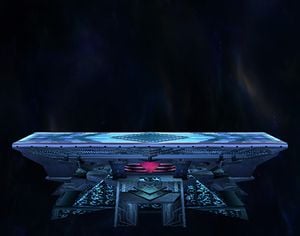
A stage (ステージ, Stage), also called a level, map, arena, stadium, or board, is a location in which characters fight or complete objectives. The word "stage" refers to the entire loaded location, but can also refer to the ground or large central platform within the level. Though versus mode stages are the most commonly recognized and utilized, single-player mode stages such as Race to the Finish or Trophy Collector exist as well for purposes other than fighting others.
Versus mode stages[edit]
Most versus mode stages in each of the Super Smash Bros. series games are available from the start, though a small number must first be unlocked by completing certain objectives. Since Super Smash Bros. 4 some stages are (or were in SSB4's case) made available through updates and are (were) downloadable. Most stages, like Princess Peach's Castle, are derived from places in playable characters' universes. Super Smash Bros. Melee introduced two stages unique to the Super Smash Bros. universe — Battlefield and Final Destination. In Super Smash Bros. Brawl, stages derived from universes without associated playable characters were introduced, namely Smashville, Hanenbow, and PictoChat. Additionally, not every playable character has a stage from their own universe; the Fire Emblem universe lacked one in Melee (though one was planned), and the R.O.B. universe has, for unknown reasons, never had a stage. Since Melee, each Smash game has included several Past Stages that debuted in previous games. These stages have either no or minor alterations (an example being Dream Land in Smash 4, where the top blast line is much closer to the stage than it was in 64 or Melee). Super Smash Bros. Ultimate changes this, giving older stages a more refined and detailed design.
Stages range in size from the large The Great Cave Offensive and Rumble Falls to the small Yoshi's Story and Peach's Castle. Typically, stages involve a large central platform with ledges, multiple smaller platforms, and blast lines above, below, and to the left and right of the visible area. Some stages, such as Mushroom Kingdom and Coliseum, have floors that continue past the edge of the visible area and pass through a side blast line. These edges are known as "walk-off edges" or "walk-offs" because characters can walk offscreen without the need to become airborne. Stages with walk-off edges on both the left and right, like Bridge of Eldin, are referred to as "walk-off stages", and only a select few, like Yoshi's Island, have only one walk-off. Some walk-off stages, such as Onett, have lower blast lines that are inaccessible normally, while others, such as Green Hill Zone, only infrequently have the lower blast lines introduced; still others, such as Mushroom Kingdom, have permanently-accessible gaps where players can fall past the lower blast line while still having solid ground covering most of the lower blast line, including its intersections with the left and/or right blast lines.
In Melee, moving and transforming stages were introduced. Big Blue and Rainbow Cruise consist entirely of platforms that move or appear on and offscreen, while stages like Icicle Mountain and PAC-LAND scroll continuously up, to the side, or down. Other stages, such as Pokémon Stadium, undergo partial transformations at certain intervals, while others, such as Castle Siege and Paper Mario, cycle through complete transformations. Similarly, stages like Delfino Plaza and Skyloft will take players to various areas via moving platforms. Mushroomy Kingdom may be one of two stages either randomly or based on a player's input prior to the match. Tortimer Island's, Gamer's, Balloon Fight's, Garden of Hope's, and Minecraft World's layouts are randomized to varying degrees for each battle as well.
Other stage elements include breakable barriers and platforms, such as the pillars of Luigi's Mansion and the stone floors of Skyworld; stage hazards and enemies, such as lasers, cars, and Klaptraps; local items such as apples; and interactive objects such as Barrel Cannons and switches. While water has no effect on movement in Melee outside of the flowing river in Jungle Japes, Brawl introduced swimming; a few stages, such as Delfino Plaza, feature bodies of water that characters can swim in.
From Brawl onwards, the appearance of some items, namely crates and barrels, differs depending on the aesthetic style of the stage they appear on.
In competitive play for every game, many tournament organizers prohibit the majority of stages (and in 64's case, all but one) from being selected due to being considered disruptive, unfair, or unbalanced by many high-level players[citation needed] (see stage legality). Ultimate tournaments often also require stage hazards to be disabled.
List of versus mode stages[edit]
This is a list of multiplayer stages in the Super Smash Bros. series.
The following does not include some single-player stages which can be playable with more than one player.
If there is an icon of a certain game in the chart (![]() ,
, ![]() ,
, ![]() ,
, ![]() ,
, ![]() ,
, ![]() ) (not the top ones), that means a new version of the stage appears in that game.
) (not the top ones), that means a new version of the stage appears in that game.
The Smash 4 icon ![]() means the new version appears in both the 3DS and the Wii U version.
means the new version appears in both the 3DS and the Wii U version.
Some stages have different names in different games. The stage's name will be marked with the game's symbol to indicate which game had which name.
| Starter | Unlockable | Paid DLC | Free DLC | Single-player only |
Notes[edit]
- ^ In Melee, this stage used the
Special Stages series symbol instead of the normal Super Smash Bros. one.
- ^ a b c d Appears as part of Flat Zone X.
- ^ In Brawl, the stage has an additional underground version based on World 1-2 alongside the standard World 1-1 version. The version will normally be selected randomly, though either version can be forced by holding down a certain button when selecting the stage. World 1-2 was removed in for 3DS and Ultimate
- ^ In Super Smash Bros. for Nintendo 3DS, Wily Castle is set during the day and has a variety of moving platforms. In Super Smash Bros. for Wii U, Wily Castle is set during the night and has platforms moving along rails, as well as the Yellow Devil.
- ^ In Ultimate, Wily Castle is set during the night and has the hazards from both versions of Smash 4.
Versus mode stages by game[edit]
In Super Smash Bros.[edit]
There are nine versus stages in the original Super Smash Bros.; eight starters and one unlockable stage: Mushroom Kingdom, shown in bold.
Peach's Castle
Congo Jungle
Hyrule Castle
Planet Zebes
Yoshi's Island
Dream Land
Sector Z
Saffron City
Mushroom Kingdom
In Melee[edit]
There are 29 versus stages in Super Smash Bros. Melee; 18 starters and 11 unlockable stages, shown below in bold. The three past stages are unlockable. Unlike the other games, each stage has a greater location listed as its stage prefix rather than which game it is from.
Special Stages Battlefield
Special Stages Final Destination
Mushroom Kingdom Princess Peach's Castle
Mushroom Kingdom Rainbow Cruise
Mushroom Kingdom
DK Island Kongo Jungle
DK Island Jungle Japes
Termina Great Bay
Hyrule Temple
Planet Zebes Brinstar
Yoshi’s Island Yoshi's Island
Yoshi’s Island Yoshi's Story
Dream Land Fountain of Dreams
Dream Land Green Greens
Lylat System Corneria
Lylat System Venom
Kanto Pokémon Stadium
F-Zero Grand Prix Mute City
Eagleland Onett
Infinite Glacier Icicle Mountain
Mushroom Kingdom II
Planet Zebes Brinstar Depths
Kanto Skies Poké Floats
F-Zero Grand Prix Big Blue
Eagleland Fourside
Superflat World Flat Zone
In Brawl[edit]
There are 41 versus stages in Super Smash Bros. Brawl; 29 starters and 12 unlockable stages, shown below in bold. None of the original Super Smash Bros. stages or the original Super Smash Bros. music stage themes return, but there are 10 stages from Melee, one from each universe involved in the original game. Super Smash Bros. Brawl also remixed several of the music stage themes from Melee.
Battlefield
Final Destination
Delfino Plaza
Mushroomy Kingdom
Mario Circuit
WarioWare, Inc.
Rumble Falls
Bridge of Eldin
Norfair
Frigate Orpheon
Yoshi's Island
Halberd
Lylat Cruise
Pokémon Stadium 2
Port Town Aero Dive
Castle Siege
Distant Planet
Smashville
New Pork City
Summit
Flat Zone 2
Skyworld
Shadow Moses Island
Luigi's Mansion
Pirate Ship
Spear Pillar
75m
Mario Bros.
PictoChat
Hanenbow
Green Hill Zone
Rainbow Cruise
Jungle Japes
Temple
Brinstar
Yoshi's Island
Green Greens
Corneria
Pokémon Stadium
Big Blue
Onett
In Smash 4[edit]
Stages in Super Smash Bros. 4 differ depending on the version. Super Smash Bros. for Nintendo 3DS features 42 stages total (seven of which are unlockable, shown in bold, and eight of which were downloadable content). Super Smash Bros. for Wii U features 55 stages (six of which are unlockable, shown in bold, and nine of which were downloadable content). Bold and italic text denotes stages that are unlockable in one version, but a starter/downloadable stage in the other. 13 stages appear in both versions (with some having changes), however, the majority of stages are exclusive to each version, with 3DS stages primarily pulled from handheld games and Wii U stages from console games (though, there are some exceptions). In addition, this is the first game where stages from all the past entries return at once.
As of March 27th, 2023, due to the discontinuation of the Nintendo eShop for the Nintendo 3DS and Wii U systems, downloadable stages can no longer be purchased.
All stages now have an optional Ω form (Omega Form), changing their layout to be similar to Final Destination - some have walls that go all the way down to the bottom blast line, while others are basically floating islands.
Most stages can be played with up to eight players in the Wii U version, though some are too complex or too small to handle that many fighters at once and will be disabled in the stage select when more players than allowed are present. Normally this is the traditional four (marked 4P below), but some stages will still allow up to six (6P). Conversely, some others are restricted to four players even on their Ω forms (4Ω), whereas most stages still allow the full eight on their Ω form even if restricted otherwise.
Starting from this game is the disabling of Star KOs and Screen KOs on certain stages.
Battlefield
4Ω Final Destination
4Ω Boxing Ring
Gaur Plain
Duck Hunt (
 added in version 1.1.1 /
added in version 1.1.1 /  available at release)
available at release)4P Wily Castle
Super Mario Maker (DLC)
Suzaku Castle (DLC)
Midgar (DLC)
Umbra Clock Tower (DLC)
- Familiar stages
 Peach's Castle (64) (DLC)
Peach's Castle (64) (DLC) Hyrule Castle (64) (DLC)
Hyrule Castle (64) (DLC) Dream Land (64) (DLC)
Dream Land (64) (DLC)
3D Land
Golden Plains
Rainbow Road
Paper Mario
Gerudo Valley
Spirit Train
Dream Land
Unova Pokémon League
Prism Tower
Mute City
Magicant
Arena Ferox
Reset Bomb Forest
Tortimer Island
Balloon Fight
Living Room
Find Mii
Tomodachi Life
PictoChat 2
Pac-Maze
- Familiar stages
 Jungle Japes
Jungle Japes Brinstar
Brinstar Corneria
Corneria Mushroomy Kingdom
Mushroomy Kingdom WarioWare, Inc.
WarioWare, Inc. Yoshi's Island
Yoshi's Island Distant Planet
Distant Planet Flat Zone 2
Flat Zone 2 Green Hill Zone
Green Hill Zone
Big Battlefield
4P Mushroom Kingdom U
Mario Galaxy
Mario Circuit
4P Jungle Hijinxs
4P Skyloft
Pyrosphere
4P Woolly World
The Great Cave Offensive
4P Orbital Gate Assault
4P Kalos Pokémon League
4Ω Coliseum
6P Flat Zone X
Palutena's Temple
4P Gamer
4P Garden of Hope
Town and City
Wii Fit Studio
4P Wrecking Crew
4P Pilotwings
4Ω Wuhu Island
Windy Hill Zone
6P Pac-Land
4Ω Miiverse (added in version 1.0.8)
- Familiar Stages
 Kongo Jungle 64
Kongo Jungle 64 Temple
Temple Yoshi's Island
Yoshi's Island Onett
Onett 4P Delfino Plaza
4P Delfino Plaza Mario Circuit (Brawl)
Mario Circuit (Brawl) Luigi's Mansion
Luigi's Mansion 75m
75m Bridge of Eldin
Bridge of Eldin Pirate Ship (DLC)
Pirate Ship (DLC) Norfair
Norfair 4P Halberd
4P Halberd Lylat Cruise
Lylat Cruise Pokémon Stadium 2
Pokémon Stadium 2 4P Port Town Aero Dive
4P Port Town Aero Dive Castle Siege
Castle Siege 6P Skyworld
6P Skyworld Smashville
Smashville
In Ultimate[edit]
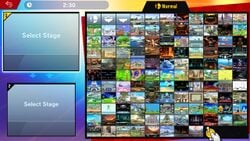
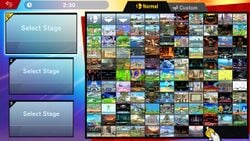
There are 115 versus stages in Super Smash Bros. Ultimate. 19 stages are unique to Ultimate while the other 96 comprise nearly every stage from previous Smash games: 7 from Super Smash Bros., 19 from Super Smash Bros. Melee, 26 from Super Smash Bros. Brawl, and 44 from Super Smash Bros. 4 (18 from the 3DS version, 18 from the Wii U version, and eight that are in both versions). Ω forms return for each stage, along with a new Battlefield form for every stage. All Battlefield and Ω forms have the same size and terrain as Battlefield and Final Destination, respectively. All stages now allow eight players.
Not counting either single-player only stages or previous versions of Battlefield and Final Destination, there are only 15 stages that do not return in Super Smash Bros. Ultimate; two from Smash 64 (Planet Zebes and Sector Z), four from Melee (Icicle Mountain, Mute City, Mushroom Kingdom and Poké Floats), two from Brawl (Rumble Falls and PictoChat), two from for Nintendo 3DS (Rainbow Road and Pac-Maze), and five from Smash for Wii U (Miiverse, Woolly World, Orbital Gate Assault, Jungle Hijinxs and Pyrosphere). Flat Zone and Flat Zone 2 do not return either, but Flat Zone X is an amalgam between them. Another unique case are the World 1-2 version of Mushroomy Kingdom and the black and white version of Dream Land GB that are also absent.
A new rules option allows stage hazards to be turned off. Stages are ordered by when they first appeared in the Super Smash Bros. series. Unlike previous entries, all stages are available from the start. Ultimate also introduces Stage Morph, an option that allows players to choose two different stages which will transition back and forth over the course of a battle.
The stage selection screen now precedes the character selection screen unlike in previous titles.
Battlefield
Small Battlefield (added in version 8.1.0)
Big Battlefield
Final Destination
New Donk City Hall
Great Plateau Tower
Moray Towers
Dracula's Castle
Mementos (DLC)
Yggdrasil's Altar (DLC)
Spiral Mountain (DLC)
King of Fighters Stadium (DLC)
Garreg Mach Monastery (DLC)
Spring Stadium (DLC)
Minecraft World (DLC)
Northern Cave (DLC)
Cloud Sea of Alrest (DLC)
Mishima Dojo (DLC)
Hollow Bastion (DLC)
Familiar Stages
 Peach's Castle
Peach's Castle Kongo Jungle
Kongo Jungle Hyrule Castle
Hyrule Castle Super Happy Tree
Super Happy Tree Dream Land
Dream Land Saffron City
Saffron City Mushroom Kingdom
Mushroom Kingdom Princess Peach's Castle
Princess Peach's Castle Rainbow Cruise
Rainbow Cruise Kongo Falls
Kongo Falls Jungle Japes
Jungle Japes Great Bay
Great Bay Temple
Temple Brinstar
Brinstar Yoshi's Island (Melee)
Yoshi's Island (Melee) Yoshi's Story
Yoshi's Story Fountain of Dreams
Fountain of Dreams Green Greens
Green Greens Corneria
Corneria Venom
Venom Pokémon Stadium
Pokémon Stadium Onett
Onett Mushroom Kingdom II
Mushroom Kingdom II Brinstar Depths
Brinstar Depths Big Blue
Big Blue Fourside
Fourside Delfino Plaza
Delfino Plaza Mushroomy Kingdom
Mushroomy Kingdom Figure-8 Circuit
Figure-8 Circuit WarioWare, Inc.
WarioWare, Inc. Bridge of Eldin
Bridge of Eldin Norfair
Norfair Frigate Orpheon
Frigate Orpheon Yoshi's Island
Yoshi's Island Halberd
Halberd Lylat Cruise
Lylat Cruise Pokémon Stadium 2
Pokémon Stadium 2 Port Town Aero Dive
Port Town Aero Dive Castle Siege
Castle Siege Distant Planet
Distant Planet Smashville
Smashville New Pork City
New Pork City Summit
Summit Skyworld
Skyworld Shadow Moses Island
Shadow Moses Island Luigi's Mansion
Luigi's Mansion Pirate Ship
Pirate Ship Spear Pillar
Spear Pillar 75m
75m Mario Bros.
Mario Bros. Hanenbow
Hanenbow Green Hill Zone
Green Hill Zone Boxing Ring
Boxing Ring Gaur Plain
Gaur Plain Duck Hunt
Duck Hunt Wily Castle
Wily Castle Super Mario Maker
Super Mario Maker Suzaku Castle
Suzaku Castle Midgar
Midgar Umbra Clock Tower
Umbra Clock Tower 3D Land
3D Land Golden Plains
Golden Plains Paper Mario
Paper Mario Gerudo Valley
Gerudo Valley Spirit Train
Spirit Train Dream Land GB
Dream Land GB Unova Pokémon League
Unova Pokémon League Prism Tower
Prism Tower Mute City SNES
Mute City SNES Magicant
Magicant Arena Ferox
Arena Ferox Reset Bomb Forest
Reset Bomb Forest Tortimer Island
Tortimer Island Balloon Fight
Balloon Fight Living Room
Living Room Find Mii
Find Mii Tomodachi Life
Tomodachi Life PictoChat 2
PictoChat 2 Mushroom Kingdom U
Mushroom Kingdom U Mario Galaxy
Mario Galaxy Mario Circuit
Mario Circuit Skyloft
Skyloft The Great Cave Offensive
The Great Cave Offensive Kalos Pokémon League
Kalos Pokémon League Coliseum
Coliseum Flat Zone X
Flat Zone X Palutena's Temple
Palutena's Temple Gamer
Gamer Garden of Hope
Garden of Hope Town and City
Town and City Wii Fit Studio
Wii Fit Studio Wrecking Crew
Wrecking Crew Pilotwings
Pilotwings Wuhu Island
Wuhu Island Windy Hill Zone
Windy Hill Zone Pac-Land
Pac-Land
Single-player stages[edit]
In the single-player modes and challenges, a number of stages appear that aren't available in versus mode without hacking or accessing it via the Debug menu.
- The Home-Run Contest stages in Melee, Brawl, SSB4, and Ultimate involve a central platform from which Sandbag is hit, and a very long stretch of ground to the right of the platform for it to land upon.
- In Melee's "trophy tussle" event matches, the player fights CPUs upon a stage that takes the form of a giant object, the trophy for which he or she wins after completing the event.
- The original Super Smash Bros. Board the Platforms stages function as agility tests, and there are 12 in total - each one is designed to challenge the player's character.
- Like Board the Platforms, Break the Targets and Target Test stages of the original Super Smash Bros. and Melee respectively are tailored to challenge each character - 12 exist in the original and 25 in Melee. Some of Melee's Target Test stages are decorated in reference to their character's universe; Pikachu's, for example, has decorative Poké Balls in its walls, while the Ice Climbers' look like a level from the game Ice Climber. Brawl, however, simply has five Target Smash! stages for all characters, each representing a different difficulty level.
- Areas in Adventure Mode and the Adventure Mode: The Subspace Emissary are technically defined as stages.
- The Online Practice Stage in Brawl, SSB4, and Ultimate is playable only while waiting for an online match to load.
- The controls test stage in Brawl, SSB4, and Ultimate is playable only for the purpose of testing custom controls, and only as Mario, or as Mii Fighters in SSB4 and Ultimate.
In Super Smash Bros.[edit]
- Duel Zone
- Board the Platforms stages
- Final Destination
- Meta Crystal
- Race to the Finish
- Break the Targets! stages
In Melee[edit]
- A variation of Battlefield with a different background exclusive to Classic, Adventure, and All-Star Modes, as well as Event Matches Space Travelers and Mewtwo Strikes!
- Adventure stages
- All-Star Rest Area - The stage the players are teleported to and from between All-Star Mode matches.
- Entei - the stage on which Event 26: Trophy Tussle 2 is played.
- Goomba - the stage on which Event 14: Trophy Tussle 1 is played.
- Home-Run Stadium
- Majora's Mask - the stage on which Event 47: Trophy Tussle 3 is played.
- Race to the Finish - a Classic Mode bonus game stage.
- Snag the Trophies stage - a Classic Mode bonus game stage.
- Target Smash stages - a set of single-player mode stages that also appear in Classic Mode as bonus games.
In Brawl[edit]
Note: In Brawl, most of these stages can be played with two players.
- Adventure Mode: The Subspace Emissary stages
- All-Star Rest Area - The stage the players are teleported to and from between All-Star Mode and Boss Battle matches
- Controls Test stage
- Home-Run Stadium
- Online Practice Stage
- Target Smash! stages - a set of single-player mode stages that also appear in Classic Mode as bonus games.
In Smash 4[edit]
Note: As with Brawl, most of these stages can be played with two players.
- Master Core's variation of Final Destination
- The Credits - A small stage where the player smashes names to reveal a picture.
- Trophy Rush stage - Raining blocks appear on the stage. If they are too far up, the stage will disappear and KO the player.
- All-Star Rest Area
- Home-Run Stadium
- Target Blast Stadium - A stage similar to the Home-Run Stadium. The player breaks the targets by smashing a bomb at them.
- Battlefield with a scrolling item platform, exclusively used in Multi-Man Smash.
- SSB4's Online Practice Stage - Same as Brawl, but the Wii U version looks like a Ω form of the Miiverse stage with a Sandbag; the 3DS version's shape bears more of a resemblance to Ω Battlefield, but with different and simpler textures.
- SSB4's control test stage - Same as Brawl.
In Ultimate[edit]
Note: As with Brawl and the Wii U version, some of these stages can be played with two players.
- Galleom, Rathalos, Marx, Dracula, and Ganon’s boss stages.
- Adventure Mode: World of Light stages:
- Galeem and Dharkon's forms of Final Destination.
- The general layout is the same for all three variants, but the backgrounds are different for each one, with the last variant featuring 4 unique backgrounds depending on which boss is still alive or close to death.
- The mode’s final stage, including:
- A vertically-scrolling section
- A boss rush area resembling Final Destination
- One of the aforementioned variants of Final Destination on which Galeem and Dharkon are fought
- Galeem and Dharkon's forms of Final Destination.
- Bonus Game stage from SSBU's Classic Mode
- Training. This only appears on the Training Mode Stage Select screen.
- SSBU's Online Practice Stage: Resembles the Battlefield-shaped portion of the Training stage.
- SSBU's control test stage - Same as Brawl and SSB4.
- Battlefield forms with a scrolling item platform, exclusively used in Mob Smash.
- Touring or transforming stages locked to certain areas used in Spirit Battles.
- Home-Run Stadium
Non-playable stages[edit]
Some stages are inaccessible through normal means. These non-playable stages are accessible only through the use of hacks and debug programs, such as Action Replay. Some, such as "Test", were presumably used for testing during game development, while others, such as the "Tutorial Stage", are used in the game but not for the purpose of gameplay.
In Super Smash Bros.[edit]
In Melee[edit]
In Brawl[edit]
- 1-Player Mode Credits - the file name of the single-player mode credits is "STGCHARACROLL.pac", which technically defines it as a stage.
- Results Screen - the results screen that appears after a match is a stage, playable only through hacking [1]
In for Wii U[edit]
- Photo Studio backgrounds - The backgrounds are all considered separate stages, and can only be played by hacking.
In Ultimate[edit]
- Results Screen - Similar to Brawl, this is programmed in as a nearly fully-playable stage, accessible only by hacking. There are also separate variants of the stage specifically for Joker and Sephiroth's victory poses.[2]
- Free the Spirit screen - This is also programmed in as a stage, only accessible by hacking.[3]
- Staff Roll screen - This is also programmed in as a stage, only accessible by hacking. It has at least a bottom blast line programmed in, but no other surfaces.[4]
Custom Stages[edit]
Brawl introduced the Stage Builder, a tool that allows players to build their own stages, for use in multiplayer matches, using sets of provided objects, some unlockable. Brawl includes a set of Sample Stages that were built using the Stage Builder. The stage builder can also be used to build No KO stages and "CD Factories" - exploitative stages used for quickly obtaining CDs. The Stage Builder returns in Super Smash Bros. for Wii U, with some features removed and other features added. In version 3.0.0 of Super Smash Bros. Ultimate, the stage builder was released with most features found in the Wii U version and significantly more features to make it the most robust version in the series.
In competitive play[edit]
Only Versus Mode stages are even considered to be tournament legal, as hacking the game to use single player stages and the requirement for each what would be tournament legal custom stage to be on each console are too much of a hassle for tournament organizers. After that, the general requirements for stage legality are usually minimal random events, no significant mid-match layout alterations, no design aspects that promote camping or stalling, and no design aspects that give a player an unfair advantage over their opponent. For these reasons, relatively few stages are universally agreed as tournament legal, with the rest being banned. While the legality of every stage will forever be contested and debated, most major tournaments abide by the same stage setlist and must unanimously agree to ban or unban a stage.
Trivia[edit]
- Ultimate is the only installment to not have any unlockable stages.
- From Brawl onward (except in for Nintendo 3DS), stages on the stage select screen show the logo of their origin game (or origin series). However, due to localization differences or certain games not being released in certain regions, various inconsistencies show up:
- If the language is set to Latin American Spanish or Canadian French, all logos will use their US English version.
- If the language is set to Castilian Spanish, European French, UK English, German, or Italian, all logos will use their properly translated European versions.
- If the language is set to Dutch or Russian, all logos will use the UK English version. (Differences between US English and UK English logos can be seen for games such as Pokémon Red and Blue versions, Tomodachi Life, Xenoblade Chronicles, WarioWare, Inc., and Fire Emblem Awakening.)
- If the language is set to Korean, games not released in South Korea use an inconsistent mixture of Japanese, US English, and UK English logos, for example using the UK English logo for Xenoblade Chronicles, the US English logo for Fire Emblem Awakening, and the Japanese logo for Super Mario USA and Made in Wario.
- If the language is set to Traditional or Simplified Chinese, a different inconsistent mixture appears, such as using the UK English logo for Tomodachi Life and the Japanese logo for Xenoblade Chronicles.
- As a unique difference between Simplified and Traditional Chinese, Simplified Chinese translates the logo for Nintendogs into Chinese, while Traditional Chinese leaves the logo untranslated.
- If the language is set to either Japanese or Chinese, the origin game for Magicant is listed as Mother. If the language is set to Korean or any Western language, the origin game is instead listed as EarthBound (and not EarthBound Beginnings), despite those being two completely different games.
- The logo for the game Find Mii is the only one to differ in all 14 languages.
- Despite these changes, Kirby Super Star uses its American logo even when the regional settings are set to Europe or Australia, where it is known as Kirby's Fun Pak.
- Port Town Aero Dive has its origin game listed as both F-Zero GX and F-Zero AX, and is the only stage to list more than one title outside of Pokémon series stages.
- The R.O.B. universe is the only franchise with a playable character to have never had a stage in any game whatsoever.
- Somewhat on the contrary, the Nintendo DS universe is technically the only franchise with more than one stage to never have a character in any game whatsoever (though many characters in the series did make their debut on the system).
- Yoshi has the highest amount of stages among the franchises that only have a single fighter, with an amount of 5.
- However, if Mario sub-franchises are discounted, then F-Zero has the highest amount of stages among the franchise with only a single fighter, with an amount of 4.
- In Ultimate, certain Poké Ball Pokémon and Assist Trophy characters cannot be summoned on certain stages, either due to the stage design hindering their abilities or another of them already appearing the stage's background. For example, Nikki cannot appear in Fourside due to the dark background obscuring her drawings, Alucard cannot appear in Wii Fit Studio due to the giant mirror in the background (since he is a vampire, which does not have a reflection), and Knuckles and Palkia cannot appear on Green Hill Zone and Spear Pillar, respectively, due to already appearing on those stages.
See also[edit]
References[edit]
| Stages in Super Smash Bros. | |
|---|---|
| Starter stages | Congo Jungle · Dream Land · Hyrule Castle · Peach's Castle · Planet Zebes · Saffron City · Sector Z · Yoshi's Island |
| Unlockable stage | Mushroom Kingdom |
| Stages in Super Smash Bros. Melee | |
|---|---|
| Starter stages | Brinstar · Corneria · Fountain of Dreams · Great Bay · Green Greens · Icicle Mountain · Jungle Japes · Kongo Jungle · Mushroom Kingdom · Mute City · Onett · Pokémon Stadium · Princess Peach's Castle · Rainbow Cruise · Temple · Venom · Yoshi's Island · Yoshi's Story |
| Unlockable stages | Battlefield · Big Blue · Brinstar Depths · Final Destination · Flat Zone · Fourside · Mushroom Kingdom II · Poké Floats |
| Dream Land · Kongo Jungle · Yoshi's Island | |
